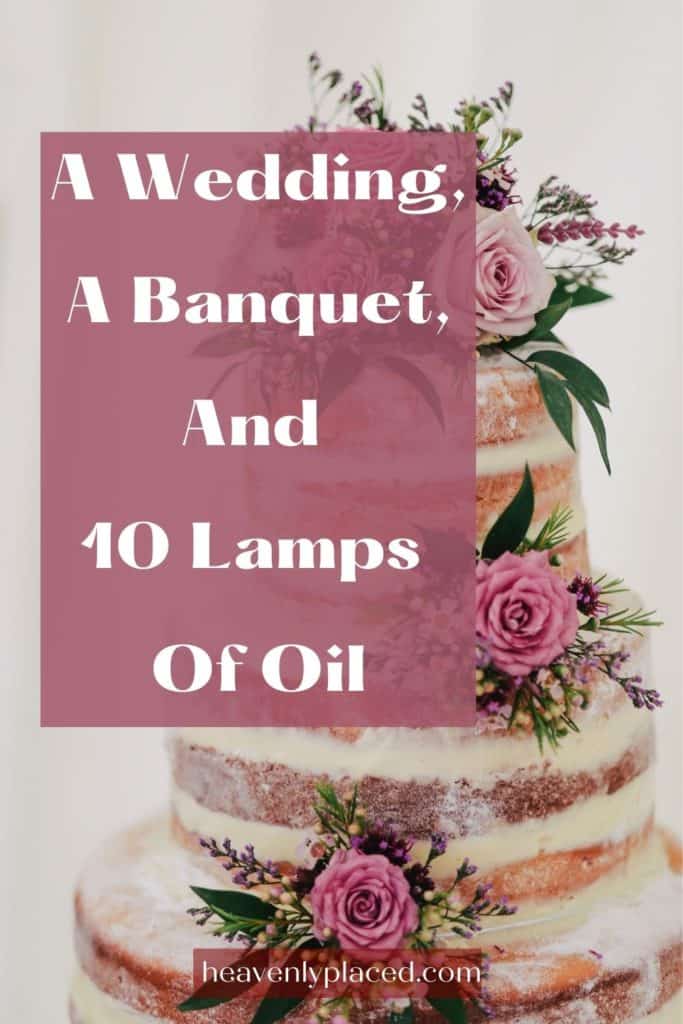A Wedding, A Banquet, And 10 Lamps Of Oil: Parables Of The Kingdom Of Heaven
I will greatly rejoice in the Lord; my soul shall exult in my God, for He has clothed me with the garments of salvation; He has covered me with the robe of righteousness as a bridegroom decks himself like a priest with a beautiful headdress, and as a bride adorns herself with her jewels. -Isaiah 61:10
June The Wedding Month
Supposedly, June is the wedding month because the goddess Juno was the protector of women. However, I think the more relevant reason is that the weather tends to be better than most other months, given as September and October are just as popular as June for weddings.
But officially, June is the wedding month.
In the Bible, Jesus told a few parables that use a wedding or banquet setting as the background. The first is the marriage of a king’s son, the second is a banquet given by a rich man, and the third is the parable of the ten virgins waiting on the bridegroom.
- June The Wedding Month
- The Parable Of The Wedding Feast
- The Parable Of The Great Banquet
- The Parable Of The Ten Virgins -Matthew 25:1-13
- What Is The Message Of The Parable?
- Clothed in the Righteousness of God
- What Does The Parable Of The 10 Virgins Teach Us?
- What Can We do to Prepare?
- Many Are Called Few Are Chosen
This post may contain affiliate links. Read the full disclosure here.
The Parable Of The Wedding Feast
The first parable is in Matthew 22:1-14. There was a king who had a son who was about to get married. So, the king sent out invitations to all the guests, but they would not come.
He then sent out his servants to tell the invited guests that everything was ready. The caterer was hired, the venue was decorated, the music was scheduled, and the cake was bought. But the guests refused to come.
Some of the guests resorted to violence and killed the messengers.
Understandably, the king was furious! He sent out his soldiers to avenge the death of those servants. They burned the city and destroyed the murderers.
Then the king told other servants to go to the highways and invite everyone they could find, both bad and good. So they did, and the wedding hall was packed and ready for the marriage.
However, when the king came through the hall, he noticed one man there who had not put on the wedding garment, which the king provided. The king inquired about the matter, and the disrespectful guest having no excuse for his behavior, was thrown out of the banquet into “outer darkness.” (Acts 13:47-48; John 15:19)

The Parable Of The Great Banquet
In Luke 14:16-24, Jesus tells the parable of a man who gave a great banquet. He prepared the tables, the decorations, and the food and told his servants to say to his friends and acquaintances to come to join him in the feast.
However, when they presented the invitation, people started making excuses. One said he had purchased land and needed to go and look at it. Another man had to work his newly acquired oxen. And another man said he was married and could not come. At the end of the day, everyone who had been invited had excused themselves from the invitation.
When the rich man heard that his invitation had been disregarded, he was indignant. “Then go out quickly to the streets and lanes of the city and bring in the poor and crippled and blind and lame,” he demanded.
After those people arrived, there was still room in the hall, so the man sent his servants out to highways and hedges to fill the banquet hall. And the men who were originally on the guest list were not allowed to come.
The Parable Of The Ten Virgins -Matthew 25:1-13
The Parable of the Ten Virgins begins before the wedding. The young women are awaiting the arrival of the bridegroom so the festivities can begin. Not knowing the hour he will appear, they bring their lamps, knowing the time may grow long. And it does. Late into the evening, the young ladies wait. Finally, they become sleepy and lay down to rest.
At midnight, the announcement comes that the bridegroom is on his way. Suddenly awaken from their sleep, five women discover that they are unprepared to meet the bridegroom. Their oil lamps have gone out, and they have no more oil to fill them.
When the other ladies refused to share their oil, knowing that they only had enough for themselves, the five foolish virgins hurry into town to purchase more oil for their lamps.
Unfortunately, when they return, the bridegroom has already come and gone. As a result, the wedding venue is closed, and no one else is allowed in.
What Is The Message Of The Parable?
Jesus compared these three parables to the kingdom of God. The nation of Israel was God’s chosen people, and they are represented in the first two parables by the guests who received the first invitations. They were invited into the kingdom but refused by not recognizing the Messiah when He came to them (John 1:11). The servants that were persecuted and murdered were the prophets sent to the Jewish people to foretell the coming of the Son of God.
The other group of people, both good and bad, crippled, lame, and blind, from the highways, streets, and cities accepted the invitation and were allowed to attend (John 1:12).
However, one guest in attendance did not have on the proper wedding garment, which in reality is Christ. To enter the kingdom of God, we must be in Christ.
Though your sins be as scarlet, they shall be as white as snow. Isaiah 1:18
Clothed in the Righteousness of God
As Christians, we are clothed in the righteousness of Christ.
The ten virgins represent us who are waiting for the return of Christ. The Bible tells us that no one knows the time of His return and that we should always be prepared. So, should we have a lamp burning at all times awaiting His return? Not hardly.
The oil in the lamp is an important factor in this parable. The oil represents the Holy Spirit. The Holy Spirit lives inside the person who has accepted Christ as their Lord and Savior. Unlike the oil in the foolish women’s lamps, He doesn’t burn out. So, if they did not have oil in their lamps, they did not truly have the Holy Spirit indwelling in their beings.
When Jesus went back to heaven after giving His life on the cross and rising from the dead, He promised that He would send a Comforter, a Companion to His disciples (John 14:16). Someone Who would walk in them, not beside them. Someone Who takes up residence in our body–making us the holy temple of God (1 Corinthians 6:19). We are no longer alone; we belong to God. The Holy Spirit guides and directs us to the extent that we allow Him to do so. Without the Holy Spirit, you will not be allowed into the marriage supper of the Lamb of God, which is the glorious celebration of all who are in Christ! (Revelation 19:9)
What Does The Parable Of The 10 Virgins Teach Us?
The parable of the Ten Virgins reinforces the importance of being watchful and ready for Christ’s return.
But concerning that day and hour no one knows, not even the angels of heaven nor the Son, but the Father only. Matthew 24:36
What Can We do to Prepare?
We do not know the day and hour, but we must be watchful and ready for His return. So, what can we do to prepare?
- Pray for His return-Jesus taught His disciples to pray, “thy kingdom come, thy will be done” in preparation for His return. Matthew 6:10
- Be holy because God is holy-live in righteousness. We cannot be perfect, but we can try. 1 Peter 1:15
- Talk to others about His return-God is willing that none shall perish, but all should come to repentance. Talk to someone about giving the lordship of their life to Jesus. 2 Peter 3:9
- Encourage other Christians-Christ’s return is an exciting event! Let’s encourage each other as the day of the Lord’s return grows nearer. 1 Thessalonians 4:18
- Watch for His Return-we do not know the time of His return, but Jesus encourages us to work and watch until that time. Mark 13:34-35 (KJV)
Many Are Called Few Are Chosen
Everyone receives the invitation to attend the wedding ceremony of the Lamb of God. The Heavenly Father desires that all attend. Many are called.
However, some want to come to the wedding on their own terms and not the Father’s. Some people think their righteousness is “good enough” to go to heaven. Or they believe their deeds are not “bad enough” to keep them out. But if they are not clothed in the righteousness of Christ, they will not be allowed to come. Few are chosen. Isaiah 61:10

Parables are a great story-telling instrument that Jesus often used to convey His point. In these three parables, it’s clear that the Father wants everyone to attend the celebration; sadly, not all will accept that invitation.
I will be there! Will you?
In the comment section below, let me know if I will see you there. If you would like, let us know where you were when you accepted God’s invitation to His Son’s wedding ceremony. I have listed mine there already!







I was tilling the garden when I accepted Christ’s invitation to the wedding. I love that old song “In the Garden”; it’s such a beautiful picture of coming to Jesus and spending time in perfect solitude with the Savior. My experience wasn’t like that. I was tired, angry, and defeated, but He showed Himself to me just when I needed Him most.